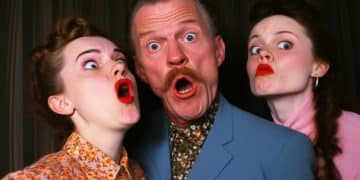Comedy Spin-Offs: 4 Shows That Topped the Originals in Popularity
Discover four comedy series spin-offs that not only escaped the shadow of their parent shows but also soared to greater popularity, redefining sitcom success.
Ever wondered if a spin-off series could actually outshine its original? Believe it or not, in the world of comedy, it’s happened—more than once! Let’s explore some **comedy series spin-off success stories: 4 shows that surpassed their original series in popularity**.
From the Sidelines to Center Stage: Comedy Spin-Offs That Hit It Big
Spin-off series have always been a gamble. Can they capture the magic of the original while forging their own identity? Sometimes, the answer is a resounding yes! These shows demonstrate that a well-crafted spin-off can not only stand on its own but also reach new heights of comedic brilliance.
But what makes a spin-off truly successful? Is it the familiar characters, the fresh storylines, or a combination of both? Let’s delve into the world of comedy spin-offs to uncover the secrets behind their success.
The Allure of Familiar Faces
One of the biggest advantages a spin-off has is the built-in audience. Viewers are already invested in the characters and the world, making them more likely to give the new show a chance. However, relying solely on nostalgia is a recipe for disaster. The spin-off needs to offer something new and exciting to keep viewers engaged.
Crafting a Unique Identity
A successful spin-off doesn’t just rehash old storylines or rely on the same jokes. It needs to establish its own identity, develop its own characters, and explore new themes. This requires a delicate balance of honoring the original while forging a new path.
- Exploring new comedic territories.
- Developing distinct character arcs.
- Addressing different social or cultural issues.
- Creating a unique visual style and tone.
Ultimately, the success of a comedy spin-off depends on its ability to stand on its own two feet. It needs to be funny, engaging, and original enough to attract a new audience while still satisfying fans of the original series. It’s a challenging feat, but as these shows prove, it’s definitely possible.
Frasier: Elevating the Sitcom to New Intellectual Heights
Frasier Crane, the stuffy psychiatrist from “Cheers,” seemed like an unlikely candidate for his own spin-off. Yet, “Frasier” became one of the most critically acclaimed and commercially successful spin-offs of all time, proving that intellectual humor could resonate with a broad audience.
The show’s success can be attributed to its sharp writing, stellar performances, and willingness to tackle complex themes. It also benefited from a change of scenery, moving Frasier from the cozy confines of a Boston bar to the sophisticated setting of Seattle.
A Change of Scenery
Moving Frasier to Seattle allowed the show to explore new characters and situations. The introduction of his brother Niles, his father Martin, and his quirky housekeeper Daphne added a whole new dynamic to Frasier’s life.
Sophisticated Humor
“Frasier” distinguished itself with its witty dialogue, literary references, and sophisticated humor. It wasn’t afraid to tackle complex topics like psychoanalysis, art, and classical music, appealing to a more intellectual audience.
- Exploring the complexities of family relationships.
- Satirizing the world of high culture.
- Using witty banter and intelligent humor.
- Creating memorable and relatable characters.
“Frasier” not only surpassed “Cheers” in terms of critical acclaim but also became a cultural phenomenon. Its enduring popularity is a testament to its clever writing, strong performances, and willingness to push the boundaries of sitcom comedy.
Maude: Tackling Taboo Topics with Boldness and Humor
Bea Arthur’s Maude Findlay, the outspoken and liberal cousin of Edith Bunker on “All in the Family,” was a force to be reckoned with. “Maude” took the groundbreaking approach of “All in the Family” and applied it to a female lead, tackling controversial issues with humor and heart.
The show’s success stemmed from its willingness to address taboo topics like abortion, menopause, and alcoholism. It also benefited from Bea Arthur’s commanding presence and the show’s sharp writing, which balanced humor with social commentary.
A Groundbreaking Protagonist
Maude Findlay was a groundbreaking character for her time. She was a strong, independent woman who wasn’t afraid to speak her mind, even if it meant challenging societal norms.
Addressing Controversial Issues
“Maude” didn’t shy away from controversial issues. It tackled topics like abortion, menopause, and alcoholism head-on, sparking conversations and challenging viewers’ perspectives.
The show’s willingness to address these issues made it a cultural lightning rod, attracting both praise and criticism. However, it also solidified its place in television history as a groundbreaking and influential sitcom.
Daria: The Animated Spin-Off That Spoke to a Generation
Daria Morgendorffer, the sardonic and intelligent teenager from “Beavis and Butt-head,” seemed like an unlikely candidate for her own show. Yet, “Daria” became a cult classic, resonating with a generation of viewers who felt alienated and misunderstood.

The show’s success can be attributed to its sharp writing, relatable characters, and unflinching portrayal of teenage angst. It also benefited from its unique animation style and its focus on social commentary.
A Relatable Outsider
Daria Morgendorffer was a relatable outsider for many viewers. She was intelligent, cynical, and didn’t fit in with the popular crowd. Her struggles with identity, acceptance, and the pressures of high school resonated with a generation of teenagers.
Social Commentary
“Daria” used its animation to offer sharp social commentary on everything from consumerism to conformity. It wasn’t afraid to poke fun at societal norms and challenge viewers to think critically about the world around them.
- Exploring the challenges of adolescence.
- Satirizing the world of high school.
- Using sharp wit and intelligent humor.
- Creating authentic and relatable characters.
“Daria” became a voice for a generation of teenagers who felt misunderstood and alienated. Its enduring popularity is a testament to its sharp writing, relatable characters, and unflinching social commentary.
The Golden Girls: Finding Humor and Heart in Senior Living
“The Golden Girls,” while not a direct spin-off, shares a similar DNA with “Maude” and “All in the Family,” exploring mature themes with a comedic touch. Though not born from a specific show, it deserves inclusion for its thematic similarities and immense success, easily surpassing the individual careers of its stars prior to the show.
The show’s success came from its willingness to discuss issues affecting older women, such as aging, loss, and loneliness, while still maintaining the lighthearted humor that drew viewers in. It offered a refreshing perspective on aging, showing that life could still be vibrant, fun, and fulfilling in your golden years.
Focus on Mature Themes
Rarely had TV shows tackled topics like widowhood, dating in later life, or health concerns of the elderly with such honesty and humor. “The Golden Girls” broke ground in representing these issues in a relatable and entertaining way.
Strong Ensemble Cast
The show’s chemistry was undeniable, with each character bringing her unique perspective to the mix. Dorothy’s sarcasm, Rose’s naivete, Blanche’s vanity, and Sophia’s bluntness created a dynamic that was both hilarious and heartwarming.
- Exploring the complexities of aging and friendship.
- Challenging stereotypes about older women.
- Using humor to address serious issues.
- Creating memorable and endearing characters.
“The Golden Girls” became a cultural phenomenon, proving that there was an audience for stories about older women. Its enduring popularity is a testament to its relatable characters, heartwarming themes, and timeless humor.
| Key Point | Brief Description |
|---|---|
| 🌟 Frasier’s Success | Sharp writing and sophisticated humor in a new Seattle setting. |
| 💪 Maude’s Boldness | Tackled taboo topics with humor, challenging societal norms. |
| 🤓 Daria’s Relatability | Spoke to a generation through sharp and cynical social commentary. |
| 👵 Golden Girls’ Heart | Explored aging with honest humor, showcasing vibrant senior living. |
FAQ
▼
A successful comedy spin-off needs to balance familiar elements from the original with fresh storylines and characters. It should also carve out its own unique identity.
▼
“Frasier” resonated with audiences because of its witty writing, sophisticated humor, and strong character development. Its setting in Seattle also offered a fresh perspective.
▼
“Maude” fearlessly tackled issues like abortion, menopause, and alcoholism, sparking important conversations and challenging societal norms.
▼
“Daria” primarily targeted teenagers and young adults who felt alienated and misunderstood, offering sharp social commentary and relatable characters.
▼
“The Golden Girls” was groundbreaking for its honest and humorous portrayal of older women, challenging stereotypes and exploring mature themes with heart.
Conclusion
These comedy series spin-offs demonstrate that with strong writing, relatable characters, and a willingness to take risks, a spin-off can not only succeed but also surpass its original in popularity. They remain beloved examples of television’s ability to reinvent and reimagine, offering laughter and insight for generations to come.





